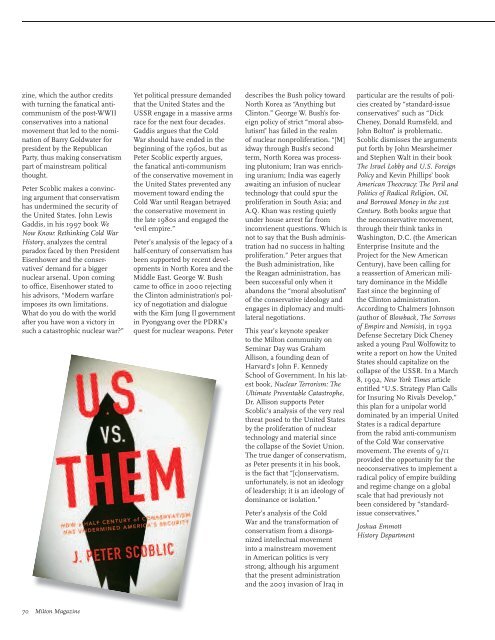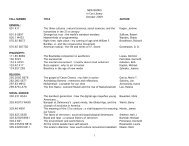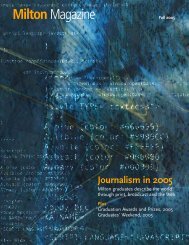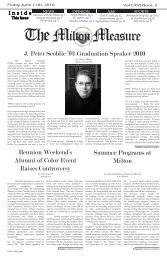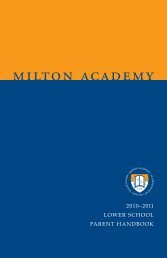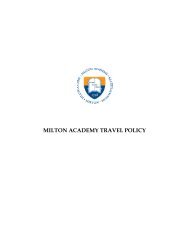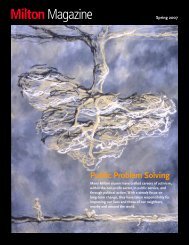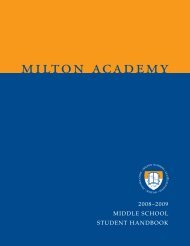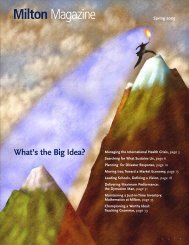Milton Magazine - Milton Academy
Milton Magazine - Milton Academy
Milton Magazine - Milton Academy
- No tags were found...
You also want an ePaper? Increase the reach of your titles
YUMPU automatically turns print PDFs into web optimized ePapers that Google loves.
zine, which the author creditswith turning the fanatical anticommunismof the post-WWIIconservatives into a nationalmovement that led to the nominationof Barry Goldwater forpresident by the RepublicanParty, thus making conservatismpart of mainstream politicalthought.Peter Scoblic makes a convincingargument that conservatismhas undermined the security ofthe United States. John LewisGaddis, in his 1997 book WeNow Know: Rethinking Cold WarHistory, analyzes the centralparadox faced by then PresidentEisenhower and the conservatives’demand for a biggernuclear arsenal. Upon comingto office, Eisenhower stated tohis advisors, “Modern warfareimposes its own limitations.What do you do with the worldafter you have won a victory insuch a catastrophic nuclear war?”Yet political pressure demandedthat the United States and theUSSR engage in a massive armsrace for the next four decades.Gaddis argues that the ColdWar should have ended in thebeginning of the 1960s, but asPeter Scoblic expertly argues,the fanatical anti-communismof the conservative movement inthe United States prevented anymovement toward ending theCold War until Reagan betrayedthe conservative movement inthe late 1980s and engaged the“evil empire.”Peter’s analysis of the legacy of ahalf-century of conservatism hasbeen supported by recent developmentsin North Korea and theMiddle East. George W. Bushcame to office in 2000 rejectingthe Clinton administration’s policyof negotiation and dialoguewith the Kim Jung Il governmentin Pyongyang over the PDRK’squest for nuclear weapons. Peterdescribes the Bush policy towardNorth Korea as “Anything butClinton.” George W. Bush’s foreignpolicy of strict “moral absolutism”has failed in the realmof nuclear nonproliferation. “[M]idway through Bush’s secondterm, North Korea was processingplutonium; Iran was enrichinguranium; India was eagerlyawaiting an infusion of nucleartechnology that could spur theproliferation in South Asia; andA.Q. Khan was resting quietlyunder house arrest far frominconvienent questions. Which isnot to say that the Bush administrationhad no success in haltingproliferation.” Peter argues thatthe Bush administration, likethe Reagan administration, hasbeen successful only when itabandons the “moral absolutism”of the conservative ideology andengages in diplomacy and multilateralnegotiations.This year’s keynote speakerto the <strong>Milton</strong> community onSeminar Day was GrahamAllison, a founding dean ofHarvard’s John F. KennedySchool of Government. In his latestbook, Nuclear Terrorism: TheUltimate Preventable Catastrophe,Dr. Allison supports PeterScoblic’s analysis of the very realthreat posed to the United Statesby the proliferation of nucleartechnology and material sincethe collapse of the Soviet Union.The true danger of conservatism,as Peter presents it in his book,is the fact that “[c]onservatism,unfortunately, is not an ideologyof leadership; it is an ideology ofdominance or isolation.”Peter’s analysis of the ColdWar and the transformation ofconservatism from a disorganizedintellectual movementinto a mainstream movementin American politics is verystrong, although his argumentthat the present administrationand the 2003 invasion of Iraq inparticular are the results of policiescreated by “standard-issueconservatives” such as “DickCheney, Donald Rumsfeld, andJohn Bolton” is problematic.Scoblic dismisses the argumentsput forth by John Mearsheimerand Stephen Walt in their bookThe Israel Lobby and U.S. ForeignPolicy and Kevin Phillips’ bookAmerican Theocracy: The Peril andPolitics of Radical Religion, Oil,and Borrowed Money in the 21stCentury. Both books argue thatthe neoconservative movement,through their think tanks inWashington, D.C. (the AmericanEnterprise Insitute and theProject for the New AmericanCentury), have been calling fora reassertion of American militarydominance in the MiddleEast since the beginning ofthe Clinton administration.According to Chalmers Johnson(author of Blowback, The Sorrowsof Empire and Nemisis), in 1992Defense Secretary Dick Cheneyasked a young Paul Wolfowitz towrite a report on how the UnitedStates should capitalize on thecollapse of the USSR. In a March8, 1992, New York Times articleentitled “U.S. Strategy Plan Callsfor Insuring No Rivals Develop,”this plan for a unipolar worlddominated by an imperial UnitedStates is a radical departurefrom the rabid anti-communismof the Cold War conservativemovement. The events of 9/11provided the opportunity for theneoconservatives to implement aradical policy of empire buildingand regime change on a globalscale that had previously notbeen considered by “standardissueconservatives.”Joshua EmmottHistory Department70 <strong>Milton</strong> <strong>Magazine</strong>


